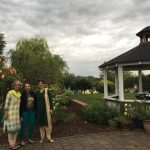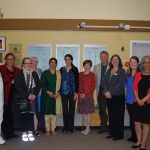The CICS was pleased to host visiting scholar and researcher Dr. Manpreet J Singh this May, 2016. Dr. Manpreet J Singh teaches at Mata Sundri College, Department of English, Delhi University. She is currently associated with Indo Canadian Study Centre, Mumbai University as a Fellow with the South Asia Diaspora Fund. The topic of her research is “Reconstructing Sikh Identity: Images and Representations in Indian and Indo Canadian Literature, Popular Culture and Social Media.”
Her research proposes to analyze the socio-cultural changes in Sikh identity emanating from the political and economic undercurrents of the last few decades, and how these have impacted a community once seen largely as a martial and agrarian people. This involves a special focus on the Canadian diaspora, in particular with a goal to study the community’s dual focus on building a new modern identity and holding onto traditional notions of the self. Community dynamics which simultaneously impede and accelerate a movement towards a new cosmopolitan identity, form part of the analyses. The study will also focus on new images adding to the old stereotypes surrounding the Sikh community, many of them arising out of the Diasporic experience. Dr Singh utilizes selected works of literature, in English, about the Sikh experience, coming from writers in the diaspora.
The Centre for Indo-Canadian Studies asked Dr. Singh a few questions related to her research interests and work:
CICS: What position do you currently hold?
Dr. Singh: I teach in Mata Sundri College for Women, Department of English, Delhi University. My Research is being funded by the Centre for Indo Canadian Studies, UFV, Family Health and Development South Asia Diaspora Fund. I am working in collaboration with Indo Canadian Studies Centre at Mumbai University.
CICS: What is your educational background and past publications?
Dr. Singh: I have an M. Phil on the work of Anita Desai and Ph.D on Shashi Deshpande, both Indian writers who write in English. My book on Deshpande, titled “Male Image, Female Gaze” is an indigenous take on theoretical feminist constructs and explores the possibility of building feminist perspectives which can work through particular cultural contexts.
CICS: What research project are you undertaking while in British Columbia? And how will you go about seeking answers?
Dr. Singh: My research project is titled “Reconstructing Sikh Identity: Images and Representations In Indian and Indo Canadian Literature, Popular Culture and Social Media.” In order to look at these facets, I narrowed in on certain urban areas in India and Canada. British Columbia being an area with a considerable Sikh population, is the area for field work in Canada. By interviewing a cross section of people from the community I wanted to look into complexities arising through socio-cultural transitions and the way the community diverges in its responses to those situations, how this impacts their engagement with the world around them, and how it influences the perceptions of those outside the community. I hope to draw parallels between these and the experiences of the community in India, which is undergoing its own set of cultural transitions under the double pressure of global influences and its social positioning as a minority community, a process aided by images created in Hindi cinema and social media.
CICS: What were some of the highlights of your visit?
Dr. Singh: I visited Surrey, Vancouver and Victoria. The most startling thing about Surrey is the all pervasive Punjabi influence. The water front in Vancouver is beautiful and so are the glass finish high rise buildings. I am lucky that I could be present in the legislature in Victoria, for the installation of the sword and medals of Sikh soldiers, just a day before the formal apology by Prime Minister Trudeau about the Komagata Maru in the Canadian Parliament. It is a very pertinent time to be in Canada, particularly in context of my area of research. I also spent time in the Sikh Heritage Museum at the National Historic Site Gur Sikh Temple which provided insight into Canada’s people, it’s social trajectories, the losses and the gains which history has brought to it. Coming here has been a memorable experience, not only in terms of research, but also for the many wonderful people who have helped in every manner possible. I am thankful to UFV and to Centre for Indo Canadian Studies for providing an opportunity to work on a project very close to my heart.




